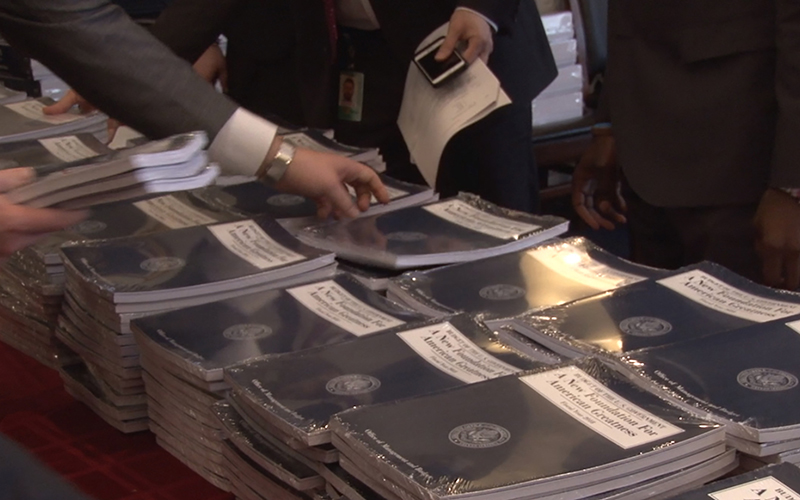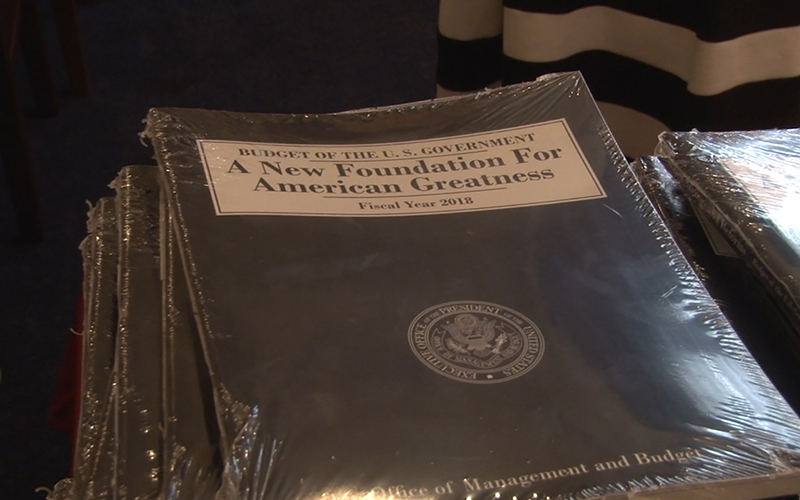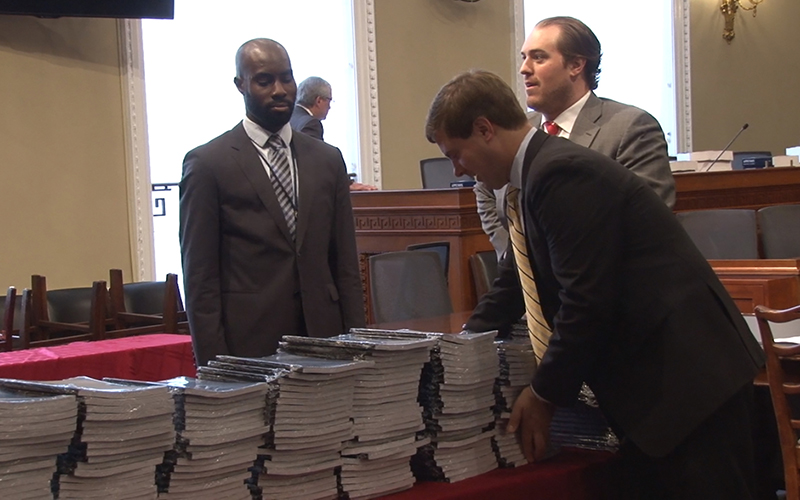
President Donald Trump’s $4 trillion budget for fiscal 2018 makes what the White House calls “targeted reductions” – and critics call painful slashing of domestic programs. (Photo by Noelle Lilley/Cronkite News)

The White House calls the fiscal 2018 budget proposal, the first under President Donald Trump, the first written from the taxpayer’s point of view. (Photo by Noelle Lilley/Cronkite News)

The Trump administration said its plan would balance the federal budget in 10 years – but critics say it will come at the expense of people like the 1.7 million Arizonans on Medicaid. (Photo by Noelle Lilley/Cronkite News)
WASHINGTON – The White House said its proposed $4.09 trillion budget shows “respect for the people who pay the bills,” but Arizona Democrats said deep domestic cuts make it a “dangerous plan” that will hurt the most vulnerable Americans.
The fiscal 2018 budget President Donald Trump unveiled Tuesday uses what the administration called “targeted reductions” to move funds from healthcare and social programs to defense and homeland security initiatives.
The White House said its plan, “A New Foundation for American Greatness,” could lead to a balanced budget within 10 years. But critics said that would come at the cost of cuts in the billions of dollars to Medicaid, nutrition, environmental and farm programs, and more.
“It’s a dangerous plan that would raise the number of uninsured Americans, take food out of the mouths of hungry children, and drive more families into poverty,” Rep. Ruben Gallego, D-Phoenix, said in a statement Tuesday.
Gallego called the president’s budget plan “a slap in the face to those who voted for” Trump.
But some Republican lawmakers in the state welcomed what Rep. Paul Gosar, R-Prescott, called “a serious proposal from the White House to tackle our country’s spending crisis and put us on sustainable path toward economic growth.”
“Kudos to the Trump Administration for reducing bureaucratic blight within the EPA (Environmental Protection Agency), supporting a true all-of-the-above energy strategy and providing much needed relief to rural communities and local stakeholders,” said Gosar in a statement from the Congressional Western Caucus, which he chairs.
Office of Management and Budget Director Mick Mulvaney told reporters Tuesday that the government should show compassion for Americans in need but it should “have compassion for folks who are paying (for) it,” according to a White House transcript of that briefing.
In a message with the budget, Trump called it a chance to “reprioritize federal spending so that it advances the safety and security of the American people.”
He defended the cuts to domestic programs, saying the government “must reform our welfare system so that it does not discourage able-bodied adults from working, which takes away scarce resources from those in real need.”
But published reports put the scope of those cuts at $3.6 trillion over a decade, including $800 billion cuts to Medicaid funding in that span, a $1.92 billion cut from food stamps and a $38 billion reduction to farm subsidies, as well as cuts to student aid, science funding and more.
The savings would be used to fund defense and homeland security initiatives, which Trump called “vital to rebuilding, modernizing, and preparing our Armed Forces for the future so that our military remains the world’s preeminent fighting force.”
That includes $1.6 billion to begin building the president’s promised border wall with Mexico and an increase of $52 billion in defense funding next year, bringing the Pentagon’s budget to $639 billion, the administration said.
Sen. John McCain, R-Arizona, said in a statement that the defense increase is “inadequate to the challenges we face.” McCain, the chairman of the Senate Armed Services Committee, said defense spending is “part of an overall budget proposal that is dead on arrival in Congress.”
But Rep. Andy Biggs, R-Gilbert, welcomed the budget, saying “the previous administration failed to protect Americans, by allowing the U.S. military to deteriorate and failing to protect our border.”
“Specifically, I am encouraged to see President Trump’s inclusion of $2.6 billion for Customs and Border Protection,” Biggs said in a statement released by his office. “We must not make any more excuses for our failure to keep our commitments to secure our borders and enforce our immigration laws.”
Biggs said the budget could reverse the looming insolvency of Social Security and Medicare that would have left “our grandchildren … with an unpayable debt.”
Democrats, however, attacked the budget, saying the planned cuts represent “a significant step backwards for our country.”
“This budget disproportionately impacts those who can least afford it,” said Rep. Tom O’Halleran, D – Sedona. “It will devastate rural economies and put critical programs on the chopping block.”
Among those programs is Medicaid, which critics noted serves 1.7 million people in Arizona. Democrats said cuts to Medicaid would hit Trump’s supporters hard.
“Anyone who supports this budget or the rest of this administration’s disturbing agenda has shown disdain for the American people,” said Rep. Raul Grijalva, D-Tucson.
Angie Rodgers, president and CEO of the Association of Arizona Food Banks, said in a statement Tuesday that the Supplemental Nutrition Assistance Program – food stamps – serves 1 million Arizonans, “half of whom are children and many who are seniors, veterans, and people with disabilities.”
“These cuts will push low-income Americans farther down the economic ladder by ripping apart nutrition programs that help provide a path out of hunger,” her statement said.